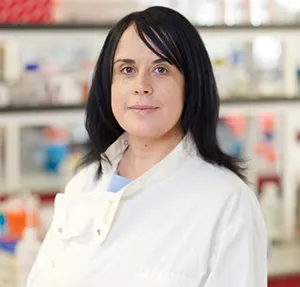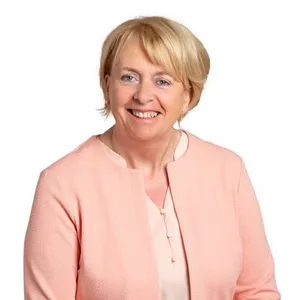Editorial Staff , 2025-05-16 06:00:00
Many people with Barrett’s Oesophagus have never heard of it and don’t know they have it but getting a diagnosis could save them from cancer in the future
It is estimated that 35,000 adults in Ireland may have a condition called Barrett’s Oesophagus, an inflammatory disease that affects the lining of the pipe connecting your mouth to your stomach. Most of these people are unknowingly living with the condition, possibly ignoring or self-treating their symptoms through over the counter antacids.
Up to five per cent of people with Barrett’s may develop oesophageal cancer. On World Barrett’s Day today (May 16), a unique partnership of researchers, charities and industry called Precision Oncology Ireland (POI), are raising awareness of the disease to encourage people experiencing symptoms to get checked out.

Prof Jacinta O’Sullivan
A long-standing collaboration exists between the Oesophageal Cancer Fund (OCF) and researcher Professor Jacintha O’Sullivan, a Professor (Chair) of Translational Cancer Biology at the Trinity St. James’s Cancer Institute – both organisations are part of POI. Together, and in partnership with POI, they established the National Barrett’s Biobank and Registry in Ireland, which saves lives through the surveillance of people diagnosed with Barrett’s and possibly at risk of developing oesophageal cancer.
The POI partnership model, which is unique in the world, has helped lead to the expansion nationally and internationally of available clinical data and research on Barrett’s and its link to cancer, with vast benefits for early detection and improved patient care.

Carmel Doyle
CEO of the Oesophageal Cancer Fund, Carmel Doyle has worked tirelessly for many years to raise awareness of Barrett’s and the potentially life-saving impact of surveillance. She has close personal experience with the illness, as her husband Gerry was diagnosed with Barrett’s and ultimately oesophageal cancer. “With Barrett’s, there is no immediate threat from it, you can live with the condition. The good thing about being diagnosed is that you will now be in the system and that is the safest place to be. Once you’re diagnosed, you will be closely monitored and you will be more aware of and more proactive about your gut health.”
Early detection saves lives
Gerry, like a lot of people, experienced chronic heartburn and was self-medicating with over-the-counter antacids. Persistent acid reflux or gastro-oesophageal reflux disease (GORD) is a main symptom of Barrett’s, although the latter often goes undetected despite repeated trips to the GP and pharmacy.
“He was drinking antacids ‘til the cows came home so I finally got him to go to the doctor, and we got the Barrett’s diagnosis,” Carmel Doyle said. Other common symptoms include regurgitation, stomach pain and belching, with men and people with excess weight and people over 50 being most at risk.
“Once you’re in the system with Barrett’s, you’ll be sent for endoscopy and biopsy, if needed, approximately every two years. This is how they catch it if things are changing.” It was through a routine scope that doctors caught changes in his cells and Gerry was diagnosed with early stage oesophageal cancer in 2011, resulting ultimately in an oesophagectomy which saved his life.
“I believe that had he not been diagnosed with Barrett’s and was not being monitored, he would not be doing so well as he is now 14 years later – having just received his ninth degree Taekwondo black belt, making him a Grand Master and doing grand!”
“This is why we need to be more aware and we need to be sending more people for scopes. If it’s ongoing chronic heartburn, it’s not normal. It needs to be checked. While typically less than five per cent of people with Barrett’s may progress to cancer, there can be traces of Barrett’s in most oesophageal cancer cases, so there is a clear link. Barrett’s is a gateway disease for oesophageal cancer.”
“Thousands of people are walking around with undiagnosed Barrett’s today in Ireland and this needs to change. Early diagnosis and monitoring of Barrett’s will protect people from developing oesophageal cancer and will help detect oesophageal cancer early. The five-year survival rate for oesophageal cancer can be doubled or trebled with early detection.”
Research is healthcare
Thanks to Professor O’Sullivan’s leadership, the long-term support from OCF and the more recent partnership with POI, the National Barrett’s Biobank and Registry in Ireland has become an invaluable resource for clinical data on the disease. This structure has opened the door to international networks sharing clinical data and has expanded collaborative research through the establishment of an All-Island Oesophageal network in partnership with Breakthrough Cancer Research.
“Fifteen years ago, we had no idea in the Republic of Ireland how many Barrett’s patients we had. We didn’t know how these patients were being managed or if and how they were being treated. We didn’t know how many progressed to oesophageal cancer – the knowledge was limited.”
This work began with funding from OCF to set up the National Registry in the Republic of Ireland, connecting different hospitals. “After 15 years building the registry, we’re now tracking around 9,500 Barrett’s patients, so we can ask those important questions: Are the numbers rising every year? How many of our patients are progressing to the next stage in terms of cellular changes? How many are progressing to cancer? We can see the answers to these questions and we can see the numbers are rising.”
The registry has led to 60,000 follow up events with the patients it tracks, monitoring disease progression and offering intervention treatments such as radiofrequency ablation which can eliminate diseased cells. Such interventions may prevent the need for an oesophagectomy later.
Biopsies from consenting patients become part of the v, providing a rich resource for researchers to study the disease and associated cancer, leading to improved patient care and treatments. “I’ve just returned from co-hosting a meeting between seven European countries focused on Barrett’s and it is clear that Ireland has a high volume of Barrett’s patients and one of the most extensive and comprehensive Barrett’s registries, which will fuel research for decades.”
“Our surveillance programme allows more patients to access new treatments and new technologies at an early stage of their disease. The biobank allows us to interrogate important questions like, why do some Barrett’s patients go on to develop cell changes and cancer and some don’t? So it is a powerful resource that can help significantly improve outcomes for patients.”
The power of the data acquired through the national registry and biobank will hopefully have the potential to impact national policy and health programmes. “We need a sustained national funding model to continue the work started by OCF, we can’t rely on small charities like so many registries and biobanks do at the moment in the Republic of Ireland. At this point, our data from the Registry highlights the possible need for national monitoring programmes. Investment in strategic partnerships like POI will continue to make patient-engaged research an integral part of delivering the best possible patient care.”

